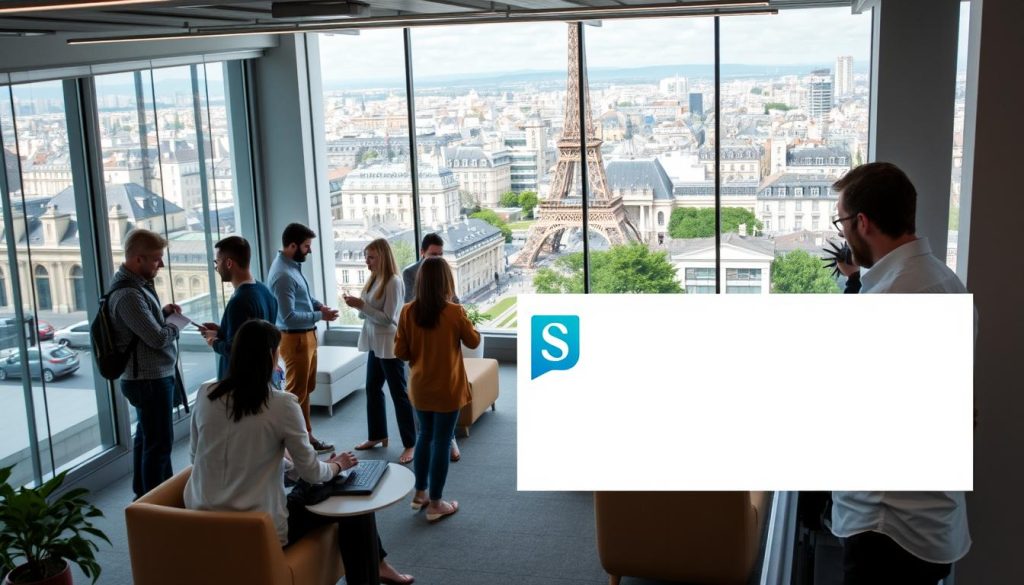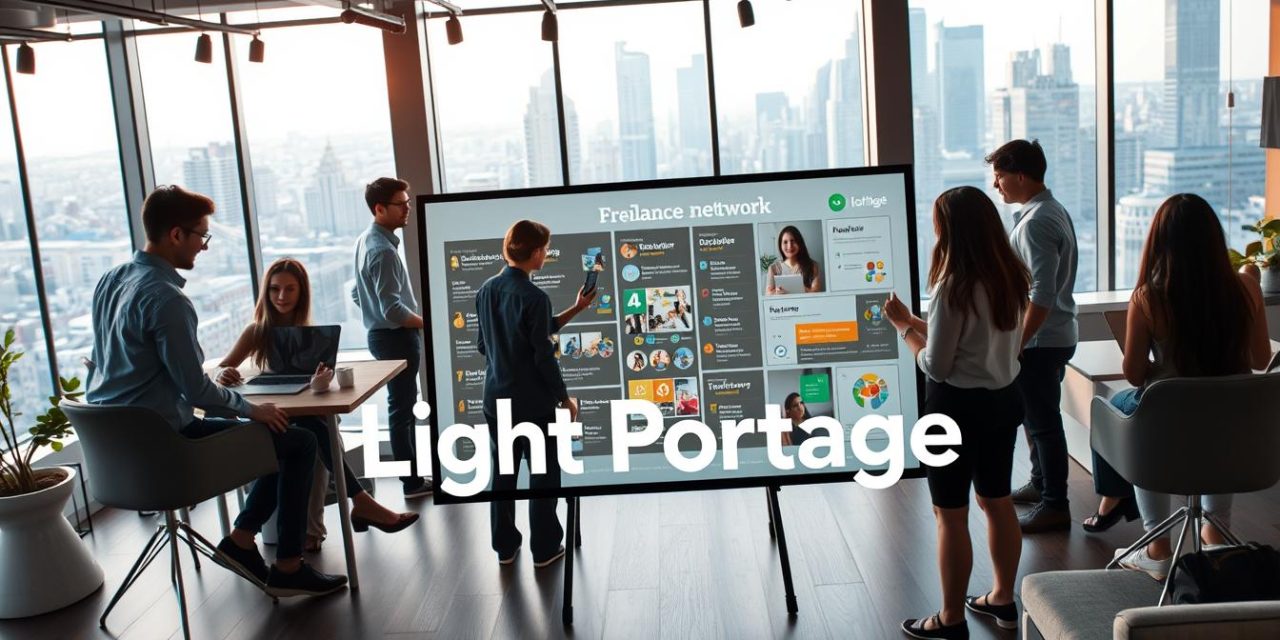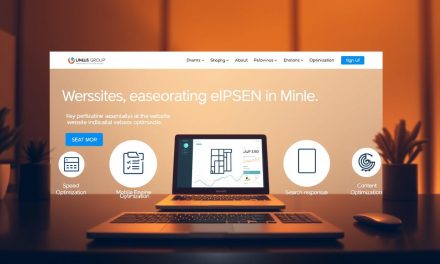Imagine building your career alone—juggling clients, chasing payments, and wondering where your next project will come from. Many indépendants in France know this struggle firsthand. But what if you had a trusted community to turn to? A network that transforms isolation into opportunity?
Across France, specialized collectifs like Le Cercle and Collective Work are redefining independence. These groups create spaces where creatives, web developers, and consultants share resources while maintaining their autonomy. Through collaborative projets and mentorship programs, members gain access to premium clients and sustainable workflows.
One member recently shared: « Joining a cercle felt like finding missing puzzle pieces—suddenly I had allies who understood my challenges. » This sentiment echoes through discussions about the future of independent work in, where collective models increasingly bridge the gap between solo work and corporate benefits.
In this guide, we’ll explore how these structured réseaux help you:
Table of Contents
Key Takeaways
- Access vetted project opportunities through trusted channels
- Strengthen your professional identity within curated networks
- Balance creative freedom with business stability
- Navigate legal and financial challenges collectively
- Grow your visibility across multiple industries
Whether you’re designing websites or consulting for startups, understanding these collaborative ecosystems could transform how you approach your travail. Let’s discover how France’s most impactful collectives create safety nets while amplifying individual success.
Introduction to Freelance Professional Associations in France
France’s independent workforce has grown by 35% since 2020, reshaping how solopreneurs approach their careers. Economic shifts and digital tools now drive collectifs to offer tailored support systems. These groups blend mentorship with practical resources, addressing modern challenges like inflation and client acquisition.
Current Trends in the French Freelance Market
Remote work adoption and specialized gig platforms have doubled opportunities for indépendants. Yet 62% report instability due to unpredictable workloads, per Freelancing.eu data. Groups like DoersCircle respond by curating sessions on contract negotiation and AI tools, helping members adapt faster.
Regional differences matter too. Paris-based creatives face fiercer competition than Lyon’s tech specialists. This diversity pushes réseau networks to tailor strategies—from Marseille’s coastal startup hubs to Bordeaux’s design communities.
Why Associations Matter for Independent Professionals
Joining a cercle isn’t just about networking—it’s survival. One web developer shared: « Our group negotiates bulk software discounts, saving me €1,200 yearly. » Structured communication channels also prevent isolation, a top concern for 58% of solo workers.
Training programs prove equally vital. Marketing collectives host monthly webinars on SEO trends, while tech groups offer coding workshops. These membres-only resources turn individual skills into market-ready portfolios, bridging gaps left by traditional education.
The Role of Associations in Empowering Freelancers
Credibility and connections form the backbone of thriving solo careers. Structured collectifs act as bridges between individual talent and market recognition, transforming isolated experts into trusted industry players. By fostering collaborative ecosystems, these groups turn fragmented skills into unified value propositions.
Forging Trust Through Shared Expertise
Groups like Le Cercle demonstrate how collective validation works. Their monthly expert panels review members’ portfolios, providing actionable feedback that elevates client proposals. One graphic designer saw her daily rate jump 40% after implementing these insights.
Peer networks also amplify opportunities through trusted referrals. A 2023 survey revealed that membres in tech-focused collectives secured 2.3x more projects than solo peers. This stems from shared communication channels where vetted opportunities circulate first among members.
Continuous learning further cements credibility. Le Cercle’s certification workshops on AI tools helped 78% of participants land higher-value contracts last year. As one member noted: « The cercle transformed my niche skills into market-ready solutions clients actively seek. »
Mentorship programs tackle isolation head-on. Collective Work pairs newcomers with seasoned specialists for quarterly strategy reviews. This approach boosted member retention by 65% in 2022 while expanding cross-industry collaborations.
Freelance Professional Associations: Key Benefits and Resources
Navigating solo careers often feels like reinventing the wheel daily—until you tap into collective wisdom. Structured groups transform individual challenges into shared victories through curated resources that elevate both skills and business outcomes.
Access to Expert Guidance and Training Sessions
Leading collectifs like Le Cercle host weekly workshops on topics from contract law to AI-driven marketing strategies. Members gain actionable insights through live Q&A sessions with industry experts, translating theory into client-ready services. Collective Work’s certification programs, for example, helped 83% of participants increase their daily rates within six months.
Specialized training directly impacts croissance. Co.sme reports 92% member satisfaction from their mentorship-driven approach, pairing newcomers with seasoned specialists for portfolio reviews. One member noted: “The feedback loop here accelerated my création process—I now deliver projects 30% faster.”
Networking Opportunities and Community Support
Beyond skill development, these groups foster réseau building through monthly meetups and virtual coworking spaces. Collective Work’s Lyon chapter connects tech specialists with local clients, resulting in 45% higher project retention rates compared to solo efforts.
Trusted referrals thrive in structured communication channels. Le Cercle’s internal platform circulates vetted opportunities first among équipe members, with 68% securing contracts through peer recommendations last year. As one web developer shared: “My collaboration pipeline doubled once I joined this collectif ecosystem.”
Spotlight on Leading Collectives and Communities
Three pioneering groups demonstrate how structured collaboration elevates solo careers. These collectifs blend strategic support with creative freedom, proving collective strength doesn’t dilute individual success.
Le Cercle: The Design Vanguard
Founded in 2018, Le Cercle unites 450+ creative membres through portfolio development workshops. Their unique « Skill Swap » program pairs graphic designers with copywriters, resulting in 37% faster projet completion rates. Member Marie Dupont credits the group: « Collaborating through Le Cercle helped me land luxury brand contracts I couldn’t access alone. »
Collective Work: Tech Specialists’ Powerhouse
This Lyon-based collectif slashes project lead times using AI-driven client matching. Their dashboard connects web developers with vetted clients, cutting proposal drafting by 52%. Co-founder Luc Bernard notes: « Our system ensures compétences align perfectly with market needs. »
Co.sme: The Cooperative Revolution
Co.sme’s profit-sharing model redistributes 30% of earnings to member upskilling programs. Their 2023 création accelerator helped participants increase daily rates by €150 on average. Digital marketer Élodie shares: « The training transformed how I pitch complex campaigns. »
Choosing the right réseau requires evaluating specialization fit and growth opportunities. As these case studies show, strategic alignment with group values unlocks doors no solo effort can match.
Diverse Specializations Among Freelance Collectives
Specialized skills drive modern collaboration. France’s collectifs now organize around precise expertise, ensuring membres deliver exceptional results in their niches. This targeted approach transforms fragmented talent into cohesive teams ready for complex projets.
Focus Areas: Technology, Design, Marketing, and More
Tech-focused groups like Growwwup unite développement web experts. Their AI-powered platforms match coders with startups needing custom sites web. One member reduced project timelines by 40% using shared code libraries.
Design collectives prioritize création excellence. Lookoom’s UI/UX specialists collaborate on prototyping tools, while marketing groups host réseaux sociaux strategy sessions. Tailored workshops keep skills sharp—Lookoom’s members report 28% faster client approvals after their certification program.
Industry-specific events amplify these benefits. A Lyon-based tech collectif hosts quarterly hackathons where developers solve real business challenges. « These gatherings helped me master new frameworks while landing three retainer contracts, » shares member Julien Moreau.
Choosing a group aligned with your compétences ensures maximum impact. As niches deepen, specialized collectives become launchpads for careers that blend individual brilliance with collective momentum.
Regional Impact: Associations Across France

Local expertise drives meaningful connections—a truth France’s regional collectifs embody through tailored community building. From Marseille’s coastal startups to Lyon’s tech hubs, these groups adapt their strategies to address unique local challenges while amplifying member compétences.
Cultivating Local Communities and In-Person Meetups
Paris-based collectif co.sme hosts monthly pitch nights where membres present solutions to neighborhood businesses. Their 2023 data shows 68% of participants secured local clients through these events. Meanwhile, Lyon’s creative collectifs organize quarterly co-working retreats, boosting collaboration on projets by 41%.
Regional differences shape event formats. Marseille’s sustainability-focused groups prioritize eco-friendly workshops, while Bordeaux wine country collectives blend vineyard tours with communication strategy sessions. “Our Lyon meetups helped me land three clients who value hyperlocal design expertise,” shares web developer Amélie Toussaint.
| Region | Focus Area | Member Growth (2023) | Event Success Rate |
|---|---|---|---|
| Paris | Tech & Startups | +29% | 82% |
| Lyon | Creative Industries | +35% | 78% |
| Marseille | Sustainability | +41% | 91% |
Face-to-face interactions remain crucial—72% of indépendants prefer in-person networking for complex projets. This preference drives groups like Collectif Horizon to host quarterly regional summits, where members troubleshoot local market challenges collectively.
Through these localized efforts, France’s meilleurs collectifs create safety nets that respect regional identities while fostering nationwide solidarity. Their success proves that community strength thrives when rooted in place-specific knowledge and trust.
Digital Transformation in Freelance Associations
Digital tools are reshaping how collaborative networks operate, creating smarter connections between talent and opportunities. From AI-driven matchmaking to blockchain contracts, collectifs now streamline operations while amplifying member croissance.
Leveraging Online Tools and AI for Community Growth
Leading groups deploy chatbots that analyze member skills and suggest projets matches with 89% accuracy. The Freelance Business Community uses machine learning to predict client needs, resulting in 32% faster project starts. Their platform also automates invoice tracking, saving members 6 hours monthly.
Blockchain secures peer-to-peer agreements through smart contracts. One collectif reported 67% fewer payment disputes after implementing this technology. AI moderation in forums flags urgent queries, ensuring communication remains focused and actionable.
Strategies for Enhanced Digital Engagement
Virtual coworking spaces with real-time collaboration tools have boosted participation by 41%. Weekly webinars feature breakout rooms where membres workshop challenges together. « The AI matchmaker connected me with a UX designer who transformed my sites web offerings, » shares Co.sme member Léa Martin.
| Tool | Function | Impact |
|---|---|---|
| AI Matchmaking | Project Pairing | +45% Efficiency |
| Blockchain Contracts | Payment Security | -67% Disputes |
| Virtual Workspaces | Collaboration | +41% Engagement |
Social media integration allows members to showcase création portfolios directly to target industries. These digital strategies don’t just simplify workflows—they redefine what collective success looks like in France’s evolving modèle travail landscape.
Membership Models and Eligibility Criteria

Choosing the right support network can make or break your journey as an independent creator. France’s collectifs offer tailored membership structures to match diverse needs—but understanding their value requires careful evaluation.
Free Versus Paid Options: What to Consider
Free memberships often grant access to basic services like community forums and event listings. These work well for newcomers testing collaborative waters. However, paid tiers unlock deeper impact positif through mentorship programs and client matching. Le Cercle’s premium plan (400€ HT/mois) includes portfolio reviews and exclusive projet leads.
Eligibility typically requires a registered business status (statut juridique). For example, Lyon’s tech-focused collectif freelances mandates proof of SIRET registration. Some groups also vet applicants based on niche skills or portfolio quality.
| Model | Cost | Key Benefits |
|---|---|---|
| Free | €0 | Networking, resource library |
| Premium | €200-600/mo | Client matching, legal support |
| Enterprise | Custom | Team training, API access |
Web developer Clara M. shares: “Investing in a paid collectif tripled my qualified leads within months.” Many groups offer 30-day trials—ideal for assessing if cette communauté aligns with your growth goals.
When selecting a model, weigh immediate needs against long-term création ambitions. Structured support often pays for itself through accelerated visibility and streamlined workflows.
Expert Sessions and Training Workshops
Continuous skill enhancement separates thriving independents from those stuck in stagnant workflows. Leading collectifs now deliver targeted learning through multiple formats, adapting to diverse schedules and learning preferences.
Webinars, In-Person Events, and Remote Sessions
Le Cercle’s « session fil rouge » exemplifies impactful training design. These monthly deep-dives combine live marketing strategy walkthroughs with peer feedback rounds. Members implement lessons immediately—web designer Marc Lefevre credits these sessions for doubling his sites web conversion rates.
Remote options break geographical barriers. The Bulldozer Collective hosts biweekly développement web workshops via interactive platforms. Participants code alongside experts, troubleshooting real projects in real time. « I mastered React.js without leaving Toulouse, » shares member Anaïs Bernard.
| Session Type | Frequency | Key Benefits |
|---|---|---|
| Webinars | Weekly | Industry trend updates |
| Workshops | Monthly | Hands-on skill building |
| Masterminds | Quarterly | Peer strategy reviews |
In-person events foster deeper connections. Lyon’s tech collectif hosts quarterly hackathons where freelances collaborate on AI solutions for local businesses. Last year’s winning team secured a €50,000 contract with a logistics startup.
« The legal workshop clarified my statut juridique options better than any online guide. »
Digital tools amplify accessibility. Recorded sessions with timestamped chapters let members revisit complex topics. Analytics dashboards track progress, suggesting personalized learning paths based on skill gaps.
These dynamic formats ensure every collectif member evolves alongside market demands—turning knowledge into measurable client results.
Navigating Challenges in Collective Freelance Work
Collaborative work models transform independence, but they require intentional strategies to combat inherent hurdles. Even within supportive collectifs, professionals may face fragmented workflows or misaligned expectations. Addressing these challenges head-on unlocks the full impact of group dynamics.
Building Bridges in Shared Workspaces
Isolation remains a top concern—42% of indépendants report feeling disconnected despite group memberships. Bulldozer Collective tackles this through daily virtual check-ins and skill-sharing boards. Their « Collaboration Hours » pair designers with developers to troubleshoot complex projets in real time.
Structured communication channels prevent misunderstandings. Members use color-coded task boards to track progress, reducing deadline misses by 37%. Weekly feedback sessions ensure alignment while respecting individual creative processes.
« Our mentorship program matches newcomers with veterans—suddenly, every roadblock has a solution partner. »
Technology bridges geographical gaps. Shared dashboards display real-time availability for spontaneous brainstorming. These tools helped 68% of Bulldozer members complete travail faster while maintaining client satisfaction scores above 4.8/5.
Practical steps for smoother collaboration:
- Set clear role definitions during project kickoffs
- Use asynchronous video updates to maintain momentum
- Celebrate shared milestones through virtual showcases
Groups like Bulldozer prove challenges become stepping stones when met with transparent systems and peer-driven support. Their approach demonstrates how structured collectifs turn potential friction into fuel for croissance.
Conclusion
Building a fulfilling independent career requires more than talent—it demands strategic alliances. Throughout this guide, we’ve seen how joining a collectif transforms isolation into momentum through expert sessions, peer networks, and digital tools. From AI-driven matchmaking to regional communauté events, these groups blend innovation with localized support.
Real-world examples prove the impact. Members gain faster access to vetted projects, master niche skills through workshops, and secure legal guidance. Digital platforms streamline communication, while in-person meetups like Lyon’s tech hackathons foster trust. Whether through strategic networking or shared resources, the right collectif becomes your career accelerator.
Your next step? Evaluate groups aligned with your expertise and growth goals. Many offer trial periods to test collaborative workflows. Remember—success thrives where individual drive meets collective wisdom. Start exploring membership options today, and join those already redefining independence through shared strength.
FAQ
What are the main benefits of joining a professional collective?
Collectives provide access to mentorship, collaborative projects, and client referrals while enhancing your credibility through shared branding. Many offer legal support, training workshops, and tools to streamline workflows.
How do free and paid membership models differ?
Free tiers often include basic networking and resource libraries, while paid plans unlock premium features like exclusive events, contract templates, and personalized career coaching. Evaluate based on your growth stage and needs.
Are these groups limited to specific regions in France?
While some collectives like Le Cercle focus on local hubs, others like Co.sme operate nationally. Hybrid models combine online communities with regional meetups for broader reach.
What digital tools do associations use to engage members?
Platforms like Slack, Discord, and LinkedIn Groups foster daily interaction. Many integrate AI-driven job-matching systems, automated invoicing software, and virtual coworking sessions to boost productivity.
How can collectives help overcome isolation in solo work?
Regular mastermind sessions, skill-sharing workshops, and collaborative client pitches create teamwork opportunities. Groups like Bulldozer Media also host retreats to strengthen peer connections.
Do these associations offer industry-specific training?
Yes. For example, design-focused collectives provide Figma workshops, while tech groups host coding bootcamps. Cross-industry webinars on topics like SEO or contract negotiation are also common.
Can I join multiple collectives simultaneously?
Absolutely. Many independent professionals participate in niche groups (e.g., Tourism Creators Network) alongside broader communities to diversify their networks and project opportunities.
What criteria should I use to choose the right collective?
Prioritize groups aligned with your specialization, values, and business goals. Review their membership structure, success metrics, and client partnerships—many offer trial periods to test compatibility.





